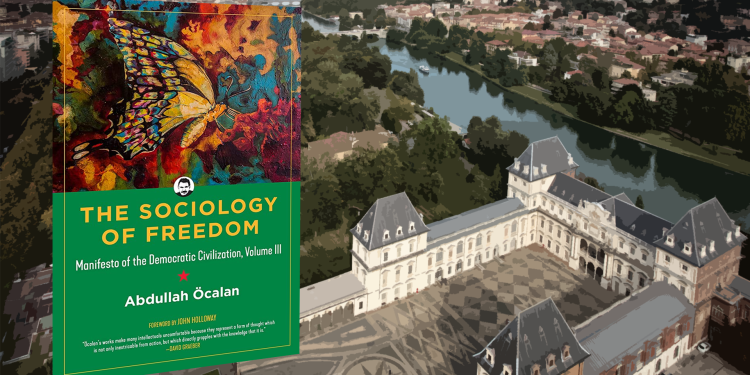TURIN – A seminar was held at the Department of Cultures, Politics and Society at the University of Turin, Italy, where Kurdish People’s Leader Abdullah Öcalan’s book, “The Sociology of Freedom” (2023), recently translated into Italian, was introduced. Speakers included Dario Padovan, professor of Environmental Sociology, Gianfranco Ragona, Professor of the History of Political Thought, and Davide Grasso, Professor of Law and Ethics in Wartimes. Around 30 students, doctoral students and academicians attended the presentation.
‘ABDULLAH ÖCALAN IS INSPIRING’
Davide Grasso recalled the harsh prison conditions of Abdullah Öcalan, who has been in complete isolation on the island of Imrali by the Turkish regime for the last two decades, “These conditions have made the writing process fraught with obstacles. However, Öcalan is a symbolic figure for a large part of the population of the Middle East.” In his speech, Grasso summarized the understanding of sociology, society and the state that he proposed in his book ‘The Sociology of Freedom’ and underlined the criticism of positivist and Eurocentric social sciences.
‘THIS BOOK IS A CHALLENGE’
prof. “This book is a challenge to some of the notions we have of the world, and it is very important to be discussed among revolutionaries today,” said Ragona.
Ragona reminded that Abdullah Öcalan’s thought developed through the examination and criticism of numerous revolutionary experiences in history; He particularly compared anarchist thought with Abdullah Öcalan’s analysis and touched upon the common points in the understanding of science, law and revolution. He also emphasized to the present revolutionaries the importance of criticizing the state understanding of the twentieth century’s revolutionary thought and said, “Today it is essential to build an alternative system in which a free life can be realized.”
Padovan stated that sociology turned into social engineering because it was based on the positivist model, but this model was insufficient to analyze and solve the problems of capitalist modernity. Instead, a holistic approach is needed, according to Padovan. The talk continued with the analysis of the common elements between the thoughts of Abdullah Öcalan and those of Braudel, Lukacs, Rosa Luxemburg and Murray Bookchin.
The meeting ended with a rich discussion and wishes for Abdullah Öcalan’s thought to be studied more in universities and to become a pillar of thought in the humanities, political and social sciences.
The statement ended with slogans.




